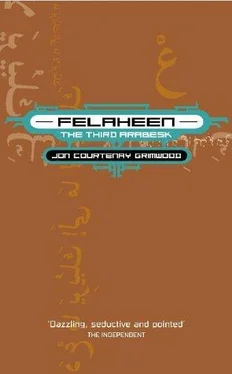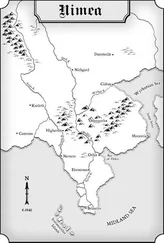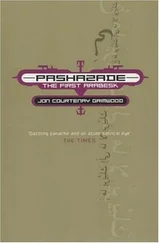Chef Edvard kept the goats to amuse. And amuse his dinner guests they did. But then Maison Hafsid's evening crowd were usually friends of Kashif Pasha, those with money and those who had actually travelled outside Ifriqiya, the kind of customers cosmopolitan enough to pay for the privilege of eating elegantly prepared retrofusion in the dining room of a draughty, half-wrecked Ifriqiyan palace opposite a mosque still called new because it was constructed during a trade boom in the mid-eighteenth century.
Maison Hafsid was owned by a tall and elderly Madagascan called Abdur Rahman, so labelled because this was one of the names specified by the Prophet as beloved by God. And, as his mother had reminded him often, "Names matter. So will you be called on the day of judgment . . ."
On his arrival in Tunis ten years earlier Abdur Rahman changed his name to Edvard. And under this name he was known to most, even Kashif Pasha and his mother Lady Maryam. But it was as Abdur Rahman he owned Maison Hafsid, because this was the name that mattered. And it was as Abdur Rahman that he had shares in Café Antonio and three other restuarants.
"You done yet?" Chef Edvard shouted.
"Nearly," said Raf and raised his chopper. Steel bit into flesh, then wood. Slicing the lamb into rough chunks, Raf slid them off his chopping board and into a glass bowl. Some kitchens kept specialist butchers. At Maison Hafsid the work was done by whomever Chef Edvard designated. It kept the cuts from getting too neat.
"I'll take it," said Isabeau and the bowl was gone.
"Well," Raf said, entirely to himself, "we're here." His voice echoed the fox's growl. That was their compromise. The fox still spoke but now Raf realized the fox was him. So far it seemed to work for both of them.
"Yeah," said Raf. He tried not to mind that the fox sounded impossibly smug. As if it, rather than chance or Raf, had been responsible for getting Raf to the kitchens of Maison Hafsid, site of one murder and supplier of culinary staff to the notables of Tunis. "Right where we need to be . . ."
Had the fox been someone else, Raf could have reminded it that its plan of sneaking off to hunt down Ibrihim Ishaq of Isaac & Sons, Kairouan, had not been an unmitigated success. As well as mentioning that Those Who Went Naked had not turned out to be the revolutionary masterminds Eugenie seemed to suggest. He could even have admitted that he missed Hani and Zara and was adrift in a city with only an instinct that here was where he was meant to be to keep him from going home.
But he'd only be telling himself. And they both knew that.
There were Turkish baths less hot than the cellar kitchens at Maison Hafsid, so everyone kept telling Raf, who was beginning to believe them. Idries had already taken him to one of the city's poorer public baths, a place of cracked tiles and broken mosaic situated just behind the central market, where he'd sat surrounded by a dozen strangers, sweat dripping from every pore as a robed attendant ladled water onto heated stones.
The cleansing room had stunk of physical effort and butchers who killed most days but sweated themselves clean once or twice a week because that was all they could afford. They were polite to the stranger in their midst. Not friendly but polite. And once, when talk touched on Carthage Dynamo vs. Sophia Crescent, the conversation widened to include him. Other than that, the atmosphere had been restrained, almost elegant in a peeling, impoverished sort of way.
Maison Hafsid was something else. No one was polite. At least not down in the kitchens. And what constituted conversation was a hard-edged banter likely to get you knifed in most bars in Seattle. Ear-bleeding nu/Rai ripped from a corner-mounted wall speaker. In the kitchen Raf didn't speak at all. He screamed into the steaming chaos. And others shouted back. Mostly about his parentage, race, sexual orientation and short life expectancy.
Anyone who took offense at Chef Edvard worked elsewhere. Actually, anyone who took offense, full-stop, left for some other industry: one not driven by impossible hours, heavy attitude and dirt-cheap drugs.
"You," he said to Raf, next time Raf staggered by under the weight of a lamb carcass. "I want to know where to file you."
Three kinds of scum ended up in kitchens apparently. Those on the run too stupid to do anything else, brilliant and spoilt artists, and finally mercenaries, those in it for the money, mostly solid and reliable line cooks. Some American years back had given his name to this law, but Chef Edvard didn't mention that, he merely wanted to know which label fitted Raf.
"All of them," said Raf.
"All?" The elderly Madagascan eyeballed his newest recruit for a long second, then slapped Raf on the shoulder. "Misfits are good," he said, his Arabic thicker than coffee grounds, "they stay longer."
Everything Raf had learnt at Café Antonio was unlearnt at Maison Hafsid. At Hafsid no one ever served swordfish or blackened chicken, even if customers asked politely. Right now Raf's job was to braise those chunks of lamb (bone and fat and skin and all). The ironically crude chunks reached the table drizzled with a custard-yellow sauce made from cloudberries flown in from Table Mountain. Given the price Maison Hafsid charged for its speciality dishes, Raf could only imagine the berries travelled first class.
"Faster," Edvard barked.
Raf nodded, but the chef was shouting at someone else.
On a marble slab to Raf's left were a series of bowls filled with herbs and spices, which a kid of about eleven kept topped on a regular basis by ripping handfuls of wilting oregano from fat twigs or grating nutmeg against a tiny grid hung on a string around his neck. Raf used a lot of oregano and nutmeg; also olive oil, anchovies, dried juniper berries and small pods for which Raf didn't yet have a name. The chef seemed to use those in almost every dish.
A great aluminium pot roiled on the edge of a hundred degrees at a station behind Raf, creating its own microclimate, waiting to soften whatever pasta was required. Linguine mostly, with a weird locally made thread noodle that came semiopaque and ended up near invisible; not that much of either got eaten to judge from the quantity scraped from dirty plates into a metal trough that ran the edge of one wall. The noodles and pasta seemed to be something between a base and a garnish.
"A hand to six . . ."
The chef's eyes found Raf, who held up five fingers and nodded. Five minutes to braise the lamb for table six and pass it across for plating. That was the difference between home cooking and doing it for real. Restaurant food got dressed, just like the customers. And an artistic sprig or a near-odourless/tasteless swirl of sauce could hide culinary sins as easily as discreet makeup and good clothes could hide sins of the flesh. Warm plates, flamboyant furnishings, elegant garnishes and adequate food, the demands of haute cuisine at Maison Hafsid were less than its devoted clientele imagined.
"Three," shouted the chef and Raf swirled his pan, smelling oil, seared flesh and oregano. Across the other side of the cellar was a wood oven for which Raf sometimes seared lamb or beef to be roasted, so that no steam from raw meat might dampen the oven's desertlike dryness. It wasn't really Raf's job but Raf was racking up favours, taking shifts he didn't want, helping to hump crates too heavy for one person alone. He'd even rescued a cucumber sauce for wild greyling with a nylon sieve, a splash of Chablis and nerves of steel, decanting it onto a warm plate seconds ahead of the plate heading for the hatch.
Mind you, Raf probably wouldn't be forgiven that one. The sauce came from an Algerian sous-chef and the deputy was less than happy. Particularly now Chef Edvard had decided Isabeau's earlier boast about Raf's having been a sous-chef himself in Seattle was true.
Читать дальше












